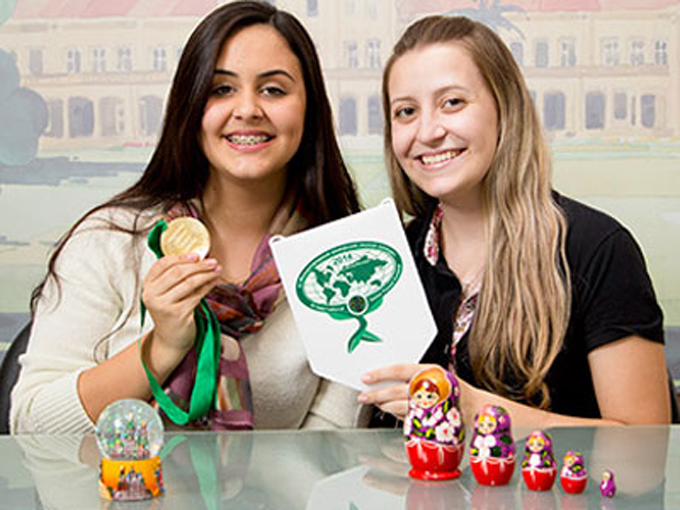Carolina Kravetz and Rafaela Pavani presented projects about Pinus taeda and orange tree wood
From Brazil to the world. That was the feeling experienced last month by two students from Luiz de Queiroz College of Agriculture. From September 8-12, Caroline Kravetz and Rafaela Freitas Pavani, both students of Forestry, attended the 11º International Junior Forest Contest in Saint Petersburg, in Russia. The event brought together the knowledge and experience of young forestry students from 27 countries, between 14 and 22 years old.
Caroline’s project was on the evaluation of the chemical and energy potential of orange tree wood, and she presented at the event her experiences regarding the quantity and quality identified from the species. The study was conducted at the Integrated Laboratories of Chemistry, Pulp and Energy under the supervision of professor José Otávio Brito, from the Forest Sciences Departments (LCF). The analyzes carried out by the student showed that the chemical potential of the orange tree wood, compared to other native species and even with the Eucalyptus, and the amount of extractives are relatively high.
Rafaela presented a paper on the effect of fertilization of late replanting of Pinus taeda in Brazil. “The research followed the dynamics of large companies because they can not make a uniform planting. Sometimes, due to the rain or operational problems, companies delay replanting and this interferes with the productivity of the area”. Therefore, the main purpose was to recover this loss by fertilizing, even with the delay in replanting. The project is part of the Potential Productivity of Pine in Brazil (PPPIB) and is linked to the Forestry Science and Research Institute (IPEF).
Experiences - According to the students, during the days that they stayed in Saint Petersburg, they also explored the cultural part. “We joke that now we have friends in every part of the world. We met people from Kazakhstan, Kyrgyzstan, Malaysia, Indonesia and other countries we never heard of ", said Rafaela. The organizers of the congress promoted students' visits to tourist spots of the city, in addition to performing interaction dynamic. The Congress maintains a policy of rewarding all participants with a certificate, medal, banner and some electronic object that emphasizes the position reached. Rafaela gained a reader for electronic books and Caroline received a mobile phone.
Written by: Raiza Tronquin
Translated by: Tobias de Paula Lima Souza
Proofread by: Marisa Aparecida B. Regitano d'Arce
Photo by: Gerhard Waller
Acom (ESALQ’s Office of Communications)
October 6th, 2014


